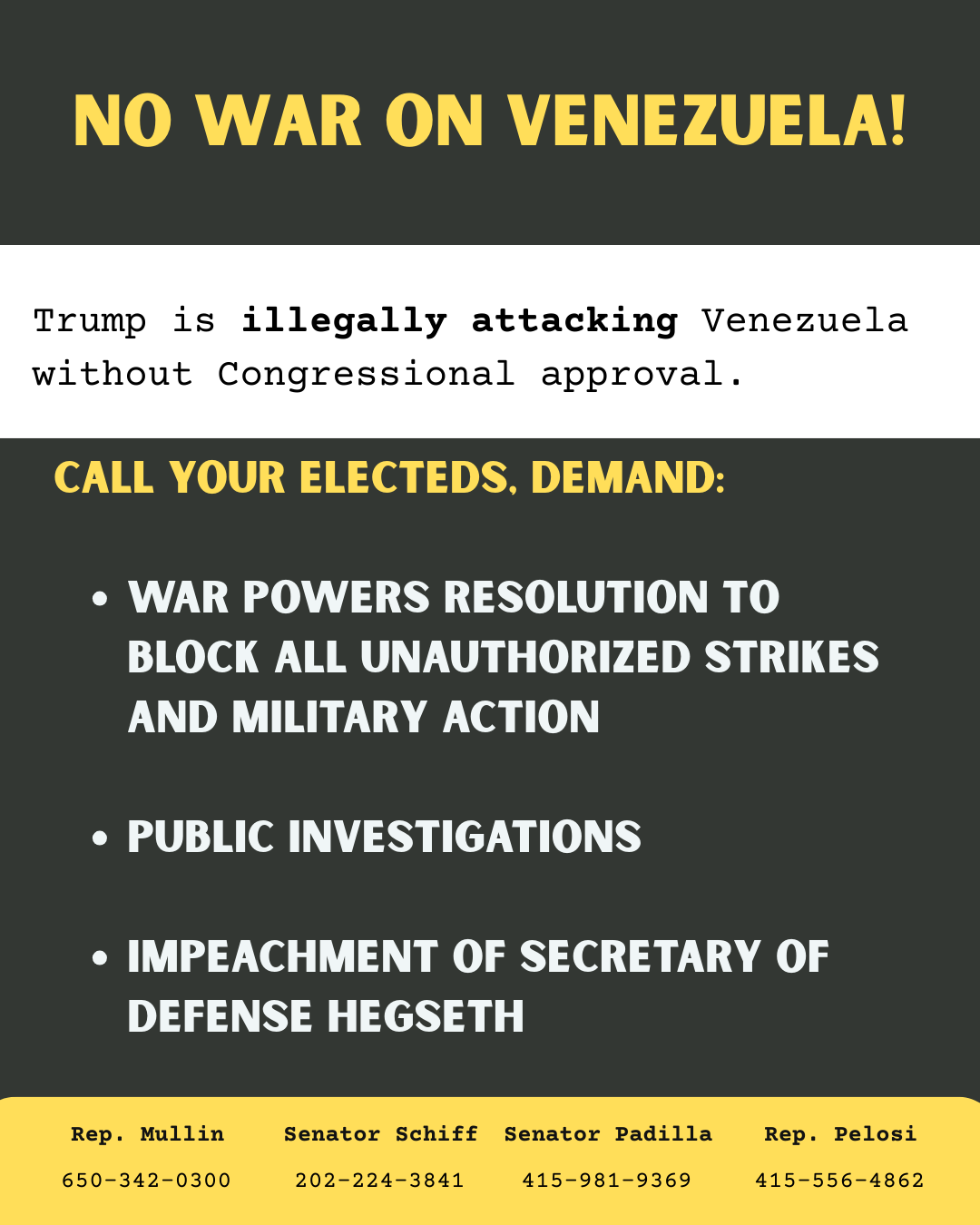Tell your Members of Congress: Dismantle Police Impunity!
Senator Dianne Feinstein
SF Office: (415) 393-0707
DC Office: (202) 224-3841
LA Office: (310) 914-7300
Fresno Office: (559) 485-7430
San Diego Office: (619) 231-9712
If you can't get through to one office, try another. There is no benefit to calling one office over another. Leaving a voicemail is as good as reaching a live person. Hate the phone? Resistbot is your friend.
Senator Kamala Harris
SF Office: (415) 981-9369
DC Office: (202) 224-3553
Sacramento Office: (916) 448-2787
LA Office: (213) 894-5000
San Diego Office: (619) 239-3884
Call the SF office first, but try the other offices if you can’t get through. If you can’t get a live person, leave a voicemail and also send a follow-up email written in your own words. Hate the phone? Resistbot is your friend.
Note: only one of the following two Congresswomen represents you. To find out which one, click here.
Speaker Nancy Pelosi
SF Office: (415) 556-4862
DC Office: (202) 225-4965
Email Contact: https://pelosi.house.gov/contact-me/email-me
Call the SF office first, but try the DC office if you can’t get through. If you get voicemail, hang up and try a few more times to talk to a real person. Don’t give up! Short direct messages are most effective. Hate the phone? Resistbot is your friend.
Rep. Jackie Speier
San Mateo Office: (650) 342-0300
DC Office: (202) 225-3531
Email Contact: https://speier.house.gov/email-jackie
Keep calling if you don’t get through. Voicemails are logged daily into a central report across offices. Hate the phone? Resistbot is your friend.
Note: Due to shelter-in-place orders during the Covid-19 emergency, it may be more effective to use email or Resistbot to contact the MoC’s office. It is important to use your own words in emails to elected officials, but feel free to use our sample script below as a guide.
Call Script
I am a member of Indivisible SF and my zip code is _______.
I’m calling to urge the [Senator/Representative] to take action to dismantle police impunity. No one is above the law, and no one should be immune from liability for the consequences of their illegal actions – not even police or government officials. A complex web of laws, rulings, and department policies and practices make police effectively immune from prosecution and liability for criminal acts and constitutional violations.
As an important first step towards dismantling impunity and restoring police accountability, I strongly urge you to append an explicit rejection of the judicially-invented concept of “qualified immunity” for police and government officials who commit crimes to the Enforcement Act (42 USC 1983).
It's also time for Congress to use its “power of the purse” to rein in police departments who refuse to police themselves. As a condition of receiving federal grants and assistance, state and local law enforcement agencies must do the following:
Prohibit officers from refusing to wear (or turning off) their body-cams, and from concealing their badge numbers or other means by which they can be identified. Require effective disciplinary action against those who do so.
Prohibit officers from making false or misleading reports to conceal or justify illegal acts and misconduct by themselves and other officers. Require effective disciplinary action against those who do so.
Since District Attorneys, who work in close cooperation with law enforcement agencies, have a clear and obvious conflict of interest, require that investigation and prosecution of potentially illegal police activity be conducted by a separate and independent court-appointed authority. Congress must refuse to authorize law enforcement related aid and grants that do not contain the three requirements listed above.
Background
The Enforcement Act of 1871 was passed during Reconstruction to protect Black voters from KKK terrorism and official misconduct. As later amended, Section 1893 of that Act codified the right of victims to sue for damages and penalties police or officials who had harmed them through criminal acts or constitutional violations. This meant that if the local powers refused to prosecute or convict cops or mayors for crimes they committed, the victims had a last resort in civil court.
Then, more than 100 years later, the Supreme Court invented a novel re-interpretation they called “qualified immunity” which granted all government officials immunity for violating constitutional and civil rights unless the victims of those violations could show that the rights were “clearly established” in legal case law precedent. Yet, the concept of “qualified immunity” does not appear in any law; it is entirely invented by SCOTUS. In subsequent cases, SCOTUS and lower courts issued rulings that made it all but impossible for victims to meet the “clearly established” threshold, so their cases are thrown out even when the judges acknowledge that the cops or officials have violated the law.
For example, a Texas prison guard who pepper-sprayed an inmate in his locked cell “for no reason” did not violate “clearly established law” because similar cited cases involved guards who had hit and tased inmates for no reason, rather than pepper-spraying them for no reason. So the victim could not sue for damages.
In a Tennessee case, a court held that cops who set their police dog on a suspect who had already surrendered did not violate “clearly established law” because the victim cited a previous case where the same court earlier held that it was unconstitutional for officers to sic their dog on a suspect who had surrendered by lying on the ground with his hands to the side. That was not sufficient, the court reasoned, because the new victim had not surrendered by lying down; instead he had surrendered by sitting on the ground and raising his hands. So the victim who was bitten could not sue for redress.
Or a case from the 9th Circuit that held officers immune from liability for the deliberate theft of property because there was no “clearly established” case law governing the identical circumstances. Police had clearly stolen $225,000 while executing a search warrant on the victim, but the court granted the crooked cops immunity because it had “never before addressed” whether officers executing a warrant could steal property. And, according to the court, it was not sufficiently “obvious” to police officers that stealing property under the guise of executing a search warrant violated an individual’s constitutional rights. As a result, the 9th Circuit said that it “need not” even address whether the officers’ stealing was illegal. So the victim could not recover the stolen money.
References
Qualified Immunity Explained, The Appeal 2/20/19
Police act like laws don't apply to them because of 'qualified immunity.' They're right, USA Today 5/30/20







